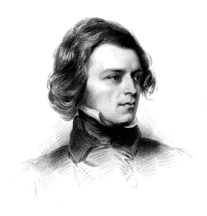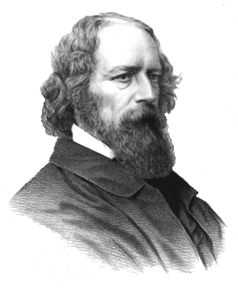∞∞∞∞∞∞∞
Sections: Biography Criticism Bibliography
∞∞∞∞∞∞∞

Alfred Tennyson (Lord Tennyson)
(Born: August 6, 1809 - Died: October 6, 1892)
“With the exception of Tennyson’s ‘Locksley Hall,’ we have never perused a poem combining so much of the fiercest passion with so much of the most ethereal fancy, as the ‘Lady Geraldine’s Courtship,’ of Miss Barrett.” (review of The Drama of Exile and Other Poems, part II, BJ, January 11, 1845).
Poe accused Longfellow of plagiarising from Tennyson in a Review of Voices of the Night, from Burton’s Gentleman’s Magazine, February 1840. Also “Imitation — Plagiarism,” from the Broadway Journal, March 29, 1845.
He also dismissed “Geraldine,” a poem by H. B. Hirst, as “a palpable imitation of Tennyson,” and that “Eleonora,” another poem in the same collection, “is taken from Tennyson’s “Oriana.” (review of Hirst’s The Coming of the Mammoth, from Broadway Journal, July 12, 1845.)
His most extended comment on Tennyson appears in an article on Channing:
“For Tennyson, as for a man imbued with the richest and rarest poetic impulses, we have an admiration — a reverence unbounded. His ‘Morte D’Arthur,’ his ‘Locksley Hall,’ his ‘Sleeping Beauty,’ his ‘Lady of Shalott,’ his ‘Lotos Eaters,’ his ‘Ænone,’ and many other poems, are not surpassed, in all that gives to Poetry its distinctive value, by the compositions of any one living or dead. And his leading error — that error which renders him unpopular — a point, to be sure, of no particular importance — that very error, we say, is founded in truth — in a keen perception of the elements of poetic beauty. We allude to his quaintness — to what the world chooses to term his affectation. No true poet — no critic whose approbation is worth even a copy of the volume we now hold in our hand — will deny that he feels impressed, sometimes even to tears, by many of those very affectations which he is impelled by the prejudice of his education, or by the cant of his reason, to condemn. He should thus be led to examine the extent of the one, and to be wary of the deductions of the other. In fact, the profound intuition of Lord Bacon has supplied, in one of his immortal apothegmns, the whole philosophy of the point at issue. ‘There is no exquisite beauty,’ he truly says, ‘without somestrangeness in its proportions.’ We maintain, then, that Tennyson errs, not in his occasional quaintness, but in its continual and obtrusive excess.” (“Our Amateur Poets — William Ellery Channing” (A), from Graham’s Magazine, August 1843)

Alfred Tennyson (Lord Tennyson)
In the same article, he comments: “Mr. Tennyson is quaint only; he is never, as some have supposed him, obscure — except, indeed, to the uneducated, whom he does not address.” From the Evening Mirror (“Increase of Poetical Heresy,”
from The Evening Mirror (New York), February 3, 1845, p. 2, col. 1.):
“In minor poetical efforts, indeed, we may not so imperatively demand an adherence to the true poetical thesis. We permit trifling, to some extent, in a work which we consider at best but a trifle. Although we agree, for example, with Coleridge, that poetry and passion are discordant, yet we quarrel not with Tennyson, when he brings to the intense passion which prompted his ‘Locksley Hall,’ the aid of that terseness and pungency which are derivable from verse. The effect he produces, however, is a purely passionate, and is not (unless in detached portions of that magnificent phillippic) a properly poetic effect. His ‘none,’ on the other hand, exalts that soul — not into passion — but into a conception of pure Beauty, which, in its elevation, its calm rapture, has in it a fore-shadowing of the spiritual life, and as far transcends earthly passion, as the holy radiance of the sun does the feeble and glimmering phosphorescence of the glow-worm. His ‘Morte D’Arthur’ is in the same majestic vein. The ‘Sensitive Plant,’ or the ‘Christabel’ — does this indisputable fact prove anything more than that the majority of mankind are more susceptible of the impulses of passion, than of the impressions of beauty. Readers do exist, however, and always will exist, who, to hearts of a fervor that maddens, unite, in perfection, the sentiment of the beautiful — that divine sixth sense, which is yet so faintly understood — that system which Phrenology attempts to embody in its organ of ideality — that sense which is the basis of all the dreams of Cousin — that sense which speaks of God, through his purest, if not through his sole attribute — that sense which demonstrates, and which alone demonstrates, His existence.” (This section is repeated from Poe’s review of Orion, Graham’s Magazine, 1844.)
A footnote in The Raven and Other Poems (1845) states: “Private reasons — some of which have reference to the sin of plagiarism, and others to the date of Tennyson’s first poems — have induced me, after some hesitation, to re-publish these, the crude compositions of my earliest boyhood.” This is explained by a letter from Poe to J. R. Lowell (March 30, 1844): “Among other points he accuses myself of “metrical imitation” of Tennyson, citing, by way of instance, passages from poems which were written & published by me long before Tennyson was heard of: — but I have, at no time, made any poetical pretension.” And again in another letter from Poe to Lowell (May 28, 1844): “There is an article on ‘American Poetry’ in a late number of the London Foreign Quarterly, in which some allusion is made to me as a poet, and as an imitator of Tennyson. I would like you to say (in my defence) what is the fact; that the passages quoted as imitations were written & published, in Boston, before the issue of even Tennyson’s first volume.”
He gives his highest praise in another letter to Lowell (July 2, 1844): “I am profoundly excited by music, and by some poems — those of Tennyson especially — whom, with Keats, Shelley, Coleridge (occasionally) and a few others of like thought and expression, I regard as the sole poets.”
From “The Poetic Principle”:
“From Alfred Tennyson, although in perfect sincerity I regard him as the noblest poet that ever lived, I have left myself time to cite only a very brief specimen. I call him, and think him the noblest of poets, not because the impressions he produces are, at all times, the most profound — not because the poetical excitement which he induces is, at all times, the most intense — but because it is, at all times, the most ethereal — in other words, the most elevating and most pure. No poet is so little of the earth, earthy.”
Tennyson is also mentioned in suggestion 30 of “Fifty Suggestions” and in the first entry in an installment of Marginalia (Democratic Review, December 1844) and the first entry of another installment (SLM, May 1849).
- “Tennyson vs. Longfellow” — (February 12, 1840 — Alexander’s Weekly Messenger)
- “Alfred Tennyson” — July 19, 1845 — Broadway Journal (This item is signed “P” in pencil in the copy of the BJ that Poe gave to S. H. Whitman.)
- Notice of Alfred Tennyson - Poems November 29, 1845 — Broadway Journal (This item is signed “P” in pencil in the copy of the BJ that Poe gave to S. H. Whitman.)
∞∞∞∞∞∞∞
- Heartman, Charles F. and James R. Canny, A Bibliography of First Printings of the Writings of Edgar Allan Poe, Hattiesburg, MS: The Book Farm, 1943.
- Mabbott, Thomas Ollive, ed., The Collected Works of Edgar Allan Poe (Vols 2-3 Tales and Sketches), Cambridge, Mass.: The Belknap Press of Harvard University Press, 1978. (Second printing 1979)
- Thomas, Dwight and David K. Jackson, The Poe Log: A Documentary Life of Edgar Allan Poe 1809-1849, Boston: G. K. Hall & Sons, 1987.
∞∞∞∞∞∞∞
[S:0 - JAS] - Edgar Allan Poe Society of Baltimore - People - Alfred Tennyson (Lord Tennyson)